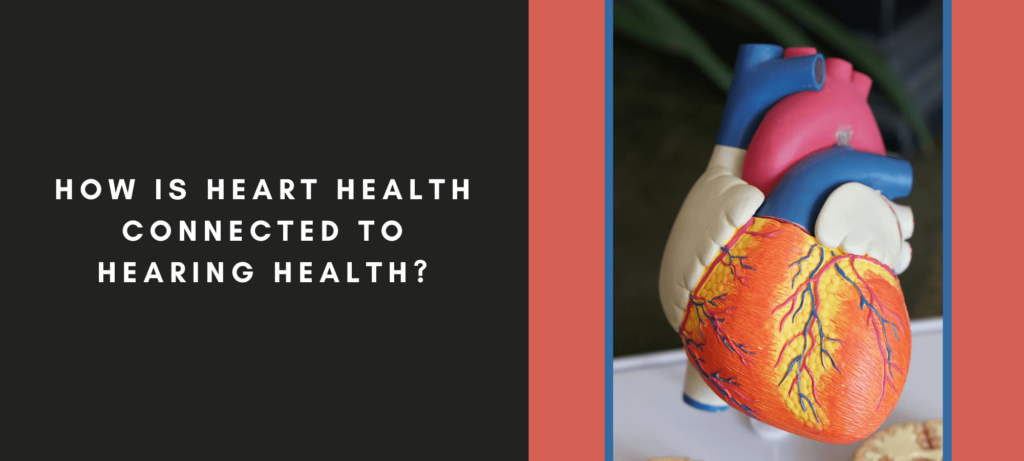February is heart 💗 month, and Cardiovascular awareness is at the forefront of the health community. Doctors will start to take extra care to remind us to take care of our heart, and what steps we can take to prevent heart disease, the leading cause of death for people in the United States. Heart disease is the most common health problem among older adults, and after arthritis, hearing loss is surprisingly the third most common health problem among older adults in the U.S. (diagram below).

Hearing loss is linked to a lot of comorbidities, or the simultaneous presence of having more than one disease or illness in a person. See the diagram of comorbidities below. Cardiovascular/heart disease is included in this diagram along with diabetes, cognitive decline, depression, falls, cancer treatments, and many others.

The question is: How is our heart health connected to our hearing health? While doctors still cannot pinpoint the exact connection, years of research indicate there is a link between a healthy cardiovascular system and hearing health. There is an obvious connection between cardiovascular decline and hearing problems. Both heart disease and hearing loss affects those who are 65 years or older more proportionally. Therefore, there is a greater chance of this particular comorbidity as we get older.
Our ear is very sensitive to blood flow, and if blood flow becomes strained throughout the body it can cause damage to our auditory system, specifically to the inner ear. This can lead to permanent sensorineural hearing loss, which can be managed with hearing aids, or other assistive devices. Dr. David R. Friedland, a specialist in Otolaryngology at the Medical College of Wisconsin in Milwaukee, has researched the connection between heart disease and hearing loss and concluded that, “The inner ear is so sensitive to blood flow that it is possible that abnormalities in the cardiovascular system could be noted here earlier than in other less sensitive parts of the body.” In other words, the first place we may be able to recognize a lack or irregularity of blood flow is in our ear, which may present as a loss of hearing. Friedland also reported that certain configurations of hearing test patterns may represent a prerequisite for those at risk for heart disease or cardiovascular events. A similar study conducted by Harvard University cited a relation between heart disease and hearing loss finding, “hearing loss occurred 54% more often in people with heart disease then in the general population.”
Fortunately, there has been a decline in heart disease over the past thirty years thanks to an incredible amount of education on prevention and treatment of the disease. However, we are not seeing a decline in hearing loss. Is it due to the lack of prevention and treatment of hearing loss, or something else? An overwhelming amount of baby boomers are educated on the prevention and treatment of heart health. However, there has been a lack of hearing prevention among the Boomer generation, not to mention the wars, concerts, and loud aerobic classes their ears endured.
Raymond H. Hull, PhD, professor of communication sciences and disorders in audiology and neurosciences at Wichita State University, and Stacy R. Kerschen, AuD, presented a comparative research study on cardiovascular health and hearing using over 60 years of available research. They found that when cardiovascular health is improved, there is a positive effect on hearing health as well. It may be that better blood circulation throughout the body correlates positively to our hearing.
In our office, a lot of the patients we see have sudden sensorineural hearing loss. They may come in reporting a sudden change in hearing in one or both ears, noticing a substantial decrease in hearing. They may not sense just a drop in hearing sound, but speech sounds could sound garbled to them. Most patients feel stressed, saddened, and confused, especially if their hearing loss has caused problems in relationships or at work.
There are a lot of different reasons for a sudden sensorineural hearing loss. Autoimmune diseases can be one reason, such as diabetes, but poor circulation of blood flow to the ear can be another. If you suspect a sudden loss in you or a loved one, please call our office and come in for an appointment as soon as possible. Time is essential in these cases, as there are treatments that may be successful in bringing back hearing if action is taken quickly.
It is clear there is a lot more research to be done in this area as a confident link between heart and hearing health has not been made. In the meantime, it couldn’t hurt to get walking! Get that blood flowing! Do some stretching. YouTube has an incredible amount of free exercise videos, and most are very good. Pick one you like and enjoy yourself.
Thanks for reading!

Sharing some connections:
The Heartline™ Study is a research study from Johnson & Johnson in collaboration with Apple. The study aims to analyze whether a heart health engagement program and Apple Watch can enable the early detection of irregular heart rhythms consistent with atrial fibrillation (AFib), and potentially improve heart health outcomes, including reducing the risk of stroke and other cardiovascular conditions. Here is the link.
How Hearing Loss & Heart Disease are Connected by Debbie Clason, published on Healthy Hearing
Sudden Hearing Loss in One Ear by Joy Victory, published on Healthy Hearing
Information about Heart Disease from the CDC
https://www.cdc.gov/heartdisease/
World Heart Day: Wednesday, September 29, 2021




